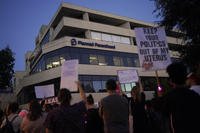The Department of Veterans Affairs on Tuesday released its proposed 2015 budget of $164 billion, reflecting a 6.5 percent increase in spending over the current year.
Among the goals VA officials say will be achieved in 2015 are the end of veteran homelessness and the elimination of the disability claims backlog, which has earned it criticism from lawmakers from both parties and even from among historic veterans' service organization allies.
The budget includes $68.4 billion in discretionary spending, of which just over $59 billion is for veterans' health care, and $95.6 billion for mandatory programs such as disability compensation and veterans' pensions, VA Secretary Eric Shinseki said in a statement.
"This budget will allow us to continue the progress we have made in helping veterans secure their place in the middle class," said Shinseki, calling the budget "a tangible demonstration" of the administration's commitment to veterans and their families.
The VA is also requesting nearly $59 billion in advance appropriations for medical care for 2016. Advance funding for healthcare programs is routine and ensures political battles in Congress do not threaten or delay funding for medical services.
The 2015 budget released on Tuesday also includes continued funding of information technology upgrades and systems aimed at ending the controversial disability claims backlog.
The budget earmarks $312 million to bring down the controversial claims backlog. The amount also includes $173 million for the Veterans Benefits Management System -- part of the Veterans Benefits Administration's "transformation plan" to put in place people and IT to handle electronic claims processing and to continue converting old paper records into electronic images and data.
Shinseki said the funding will enable the VA to achieve its goal of eliminating the backlog by the end of 2015. Elimination means reducing wait times on claims decisions to within 125 days with an accuracy rate of 98 percent.
The backlog -- which for the purpose of Shinseki's plan counts only first-time claims applications -- currently numbers about 400,000. The VA has said that as more original claims are filed electronically and older claims are converted to digital, the pace will pick up.
Veterans groups and lawmakers on Capitol Hill continue to be skeptical, however, especially after showing progress last year in reducing the backlog the number climbed again.
Additionally, the 2015 budget includes more than $2 billion for programs to expand services to veterans, including $567 million for telehealth services for vets in rural and remote areas; $403 million for women-specific health programs; $534 million for new and enhanced health care facilities; $562 for ongoing construction projects; $86.6 million for improving customer service applications for online portals and call centers; and $3.6 million to open two new national cemeteries in Florida and to prepare for the opening of two new rural national burial grounds.
A VA official said the location of the new burial grounds have not yet been determined.
The VA's plan for ending veteran homelessness will get another $1.6 billion in program funding under the 2015 budget. The money would fund VA direct assistance and programs the VA operates with community agencies and non-profits to help veterans and their families that are at risk of becoming homeless.
VA is also asking for more than $5 billion next year to administer and maintain national cemeteries. About $4 billion of that budget would be for information technology, according to the budget highlights released by the department.
Shinseki said the VA's commitment to veterans "spans generations."
"From the men and women of 'the greatest generation' to the Veterans who have returned from Iraq and those returning from Afghanistan, VA will make sure our benefits are useful and accessible," he said.
-- Bryant Jordan can be reach at bryant.jordan@monster.com




























